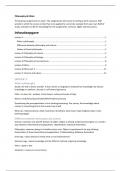Class notes
Lecture notes on Introduction to Philosophy and Ethics
- Course
- Institution
This 13 page document includes lecture notes of all lectures given in the course Introduction to Philosophy and Ethics (Radboud University KWI-FFIL100, 3 EC) The lecture notes can be used as tools to make the essays requires in the course.
[Show more]



